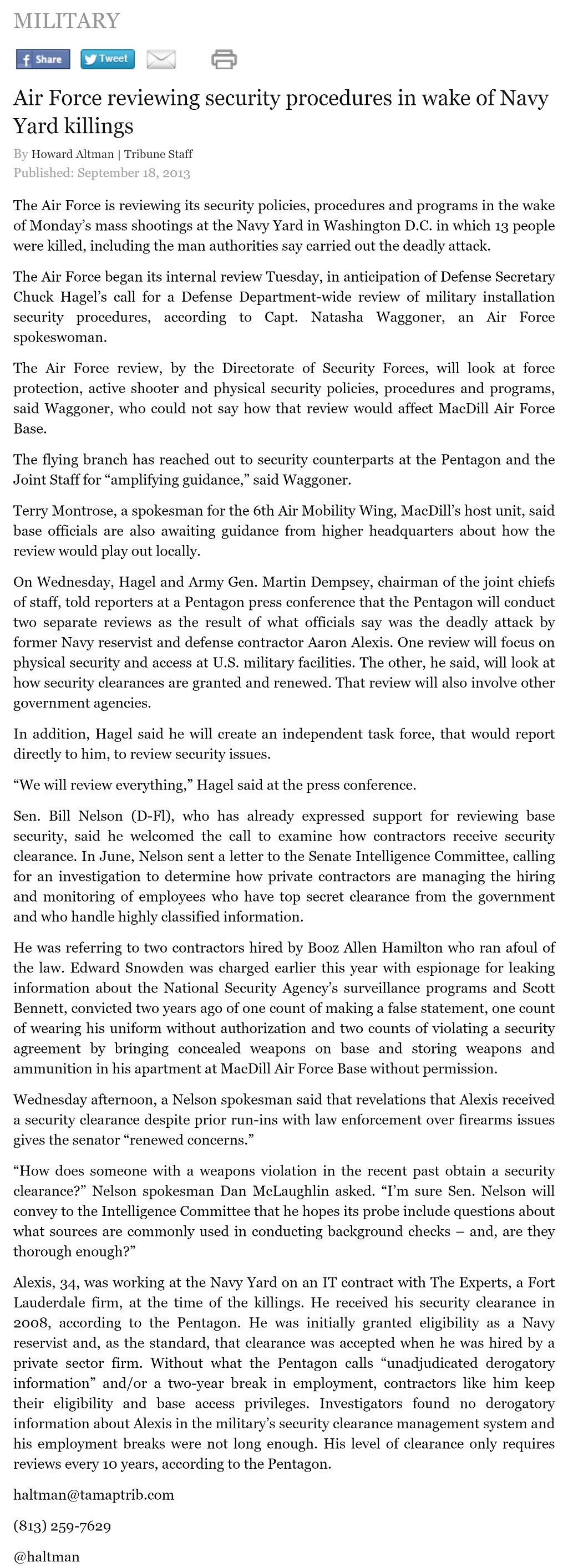
The Air Force is reviewing its security policies, procedures and programs in the wake of Monday’s mass shootings at the Navy Yard in Washington D.C. in which 13 people were killed, including the man authorities say carried out the deadly attack.
The Air Force began its internal review Tuesday, in anticipation of Defense Secretary Chuck Hagel’s call for a Defense Department-wide review of military installation security procedures, according to Capt. Natasha Waggoner, an Air Force spokeswoman.
The Air Force review, by the Directorate of Security Forces, will look at force protection, active shooter and physical security policies, procedures and programs, said Waggoner, who could not say how that review would affect MacDill Air Force Base.
The flying branch has reached out to security counterparts at the Pentagon and the Joint Staff for “amplifying guidance,” said Waggoner.
Terry Montrose, a spokesman for the 6th Air Mobility Wing, MacDill’s host unit, said base officials are also awaiting guidance from higher headquarters about how the review would play out locally.
On Wednesday, Hagel and Army Gen. Martin Dempsey, chairman of the joint chiefs of staff, told reporters at a Pentagon press conference that the Pentagon will conduct two separate reviews as the result of what officials say was the deadly attack by former Navy reservist and defense contractor Aaron Alexis. One review will focus on physical security and access at U.S. military facilities. The other, he said, will look at how security clearances are granted and renewed. That review will also involve other government agencies.
In addition, Hagel said he will create an independent task force, that would report directly to him, to review security issues.
“We will review everything,” Hagel said at the press conference.
Sen. Bill Nelson (D-Fl), who has already expressed support for reviewing base security, said he welcomed the call to examine how contractors receive security clearance. In June, Nelson sent a letter to the Senate Intelligence Committee, calling for an investigation to determine how private contractors are managing the hiring and monitoring of employees who have top secret clearance from the government and who handle highly classified information.
He was referring to two contractors hired by Booz Allen Hamilton who ran afoul of the law. Edward Snowden was charged earlier this year with espionage for leaking information about the National Security Agency’s surveillance programs and Scott Bennett, convicted two years ago of one count of making a false statement, one count of wearing his uniform without authorization and two counts of violating a security agreement by bringing concealed weapons on base and storing weapons and ammunition in his apartment at MacDill Air Force Base without permission.
Wednesday afternoon, a Nelson spokesman said that revelations that Alexis received a security clearance despite prior run-ins with law enforcement over firearms issues gives the senator “renewed concerns.”
“How does someone with a weapons violation in the recent past obtain a security clearance?” Nelson spokesman Dan McLaughlin asked. “I’m sure Sen. Nelson will convey to the Intelligence Committee that he hopes its probe include questions about what sources are commonly used in conducting background checks – and, are they thorough enough?”
Alexis, 34, was working at the Navy Yard on an IT contract with The Experts, a Fort Lauderdale firm, at the time of the killings. He received his security clearance in 2008, according to the Pentagon. He was initially granted eligibility as a Navy reservist and, as the standard, that clearance was accepted when he was hired by a private sector firm. Without what the Pentagon calls “unadjudicated derogatory information” and/or a two-year break in employment, contractors like him keep their eligibility and base access privileges. Investigators found no derogatory information about Alexis in the military’s security clearance management system and his employment breaks were not long enough. His level of clearance only requires reviews every 10 years, according to the Pentagon.
